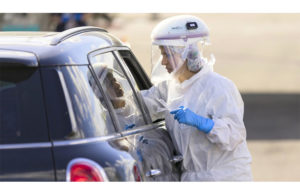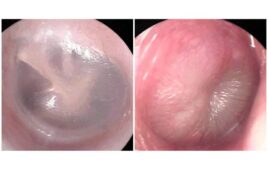
(Image from Mayo Clinic)
Months into the pandemic, the FDA continues to grant emergency use approval (EUA) to new tests to detect the virus that causes COVID-19 and the antibodies that indicate a person has had it.
To date, the FDA has granted EUAs for 171 tests —142 molecular tests, 27 antibody tests, and 2 antigen tests. Given the ever-changing landscape of tests for COVID-19 and the rapid rise of coronavirus cases in the parts of the country, we thought an overview of these tests might be helpful.
Diagnostic tests
So far, there are two types of diagnostic tests granted EUAs for COVID-19.
Molecular, or RT-PCR tests, were developed to detect nucleic acid — genetic material — from SARS-CoV-2, the virus that causes COVID-19. Most samples are collected using a nasal or throat swab, but a few are taken from patient saliva. Some locations can provide results from a molecular test the same day, while others take up to a week. The spike in illness in certain states has led to longer waits for results.
The FDA considers these tests highly accurate, and has said they usually don’t need to be repeated. A positive test result for COVID-19 indicates that RNA from SARS-CoV-2 was detected, and the patient is infected with the virus and presumed to be contagious. Molecular tests cannot detect whether someone has had COVID-19 in the past.
Antigen tests promise to produce results faster than their molecular counterparts. They are formulated to quickly detect fragments of proteins found on or within the virus by testing samples collected from the nasal cavity using swabs. Quidel landed the first COVID-19 EUA for an antigen test in May, saying it could produce results in 15 minutes. Quidel said its Sofia 2 SARS Antigen FIA test has 87.5% sensitivity (ability to exclude false negatives) and 100% specificity (ability to exclude false positives).
Becton Dickinson (NYSE:BDX) announced Monday that it had won an EUA for an antigen test that the company said can also produce results in 15 minutes with 84% sensitivity and 100% specificity.
Antigen tests may produce results more quickly, but there are questions about their sensitivity. According to the World Health Organization (WHO), antigens detected are expressed only when the virus is actively replicating, meaning these tests work best to identify acute or early infection. How well the tests work depends on several factors, including the time from onset of illness, the concentration of virus in the specimen, the quality of the specimen collected from a person and how it is processed, and the precise formulation of the reagents in the test kits.
Based on experience with antigen-based rapid-diagnostic tests for other respiratory diseases such as influenza, in which affected patients have comparable concentrations of influenza virus in respiratory samples as seen in COVID-19, the sensitivity of these tests might be expected to vary from 34% to 80%, the WHO said in April.
According to the Mayo Clinic, a positive antigen test result is considered very accurate, but there’s an increased chance of false negative results and a physician may recommend a molecular test to confirm a negative antigen result.
Serology tests
Serology tests have been developed to detect the presence of antibodies in the blood when the body is responding to a specific infection rather than detecting the virus itself. It takes time for the body to build up an immunity to the virus that causes COVID-19, making serology tests unreliable for detecting new infections.
Mostly, they are used to detect whether someone has already had the virus and might be eligible to donate a part of their blood called convalescent plasma to help treat those who are seriously ill from COVID-19.
Not all serology tests are the same. For example, researchers in England recently found that an antibody test made by Siemens Healthineers (ETR: SHL) performed well on both sensitivity and specificity, while tests by Abbott (NYSE:ABT), DiaSorin and Roche met only the specificity criterion used. These researchers, from Public Health England, the University of Oxford and Oxford University Hospitals, studied the results of four SARS-CoV-2 antibody assays over a 3-week period in May and June 2020 — the Abbott SARS-CoV-2 Immunoassay, DiaSorin’s Liaison SARSCoV-2 S1/S2 IgG, Roche’s Elecsys Anti-SARS-CoV-2, and Siemens’ SARS-CoV-2 Total (COV2T).
Other studies are underway to determine whether the presence of antibodies conveys a level of immunity that would prevent or reduce the severity of re-infection as well as the duration for which immunity lasts.




